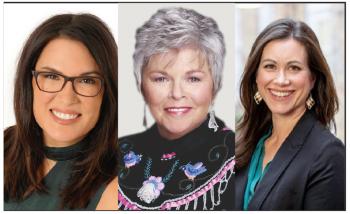Image Caption
Summary
Local Journalism Initiative Reporter
Windspeaker.com
“In the COVID-19 world the needs are greater,” said Roberta Jamieson, president of Indspire, an Indigenous national charity that supports students, primarily financially, to obtain higher education.
Due to the coronavirus pandemic causing a slow down in the national economy, Indigenous students were unable to find summer jobs. Much of the post-secondary schooling has changed platforms, now offered online. This presents complications for students who don’t have access to reliable internet.
“We have to work harder, involve more partners,” said Jamieson, referring to what lies ahead for Indigenous students, and to highlight a recent report prepared by Indspire and the Canadian Council for Aboriginal Businesses.
Insights into Indigenous Post-Secondary Graduates’ Experiences in the Canadian Workforce was the topic of a joint Indspire/CCAB webinar on Oct. 7.
Using data collected from Indspire’s 2020 National Education Survey of Building Brighter Futures (BBF): Bursaries, Scholarships, and Awards recipients, as well as Statistics Canada’s Census of Population (2016), the picture painted is a positive one.
Almost 90 per cent of BBF recipients who completed their programs are employed. Approximately 35 per cent of BBF recipients work for Indigenous employers and three-quarters of these found suitable work in Indigenous communities.
Tabatha Bull, CEO for CCAB, says reports like this one, which looks at Indigenous youth, education and employment, are valuable and there hasn’t been enough of this kind of research done.
“I think how much it highlights the need for us… to understand the gaps in education and the gaps from education moving into the workforce and what more we need to be doing to both fill those gaps and understand why they exist,” she said.
CCAB is a national, non-partisan association, which fosters economic opportunities for Indigenous peoples and businesses across Canada.
According to the report, which was Ontario focused, “individuals employed by Indigenous employers, on average, more strongly agree they feel valued at work, are satisfied with their current employment, that they work the desired number of hours and that their work enables them to have a positive work-life balance.”
Bull said “It’s important to note that the study didn’t find that Indigenous grads had to sacrifice employment income in order to have that work satisfaction and I think that’s something important to note. Nor did we see less pay working for Indigenous employers than for non- Indigenous employers… (and) we do see that work-life balance is so important, particularly in Indigenous communities.”
That’s a trend Jamieson would like to see “continue and amplify.”
According to the study, there is a higher number of BBF recipients who are self-employed than other Indigenous workers of the same age. Self-employed BBF recipients are more concentrated in the health care and social assistance, educational services, construction, and real estate rental and leasing sectors than in the broader Indigenous population.
That’s not surprising, said webinar panel member Melissa Hardy-Giles, who points out that many of these sectors are common in most Indigenous communities.
Hardy-Giles is owner of ORIGIN, a company that works with job seekers, Aboriginal communities, and employers in Northern Ontario to enable Indigenous workforce participation.
“We’re creators of habit and we like to stick with what we know and what we’ve experienced. So I would think that most entrepreneurs start business in areas where they have their own natural gifts and interests and experiences and skills, so I think that’s why these sectors are represented more,” she said.
However, the report found that Indigenous businesses had a hard time finding qualified Indigenous employees.
“At Indspire we’re going to continue to work with many of our partners to understand labour force demand for Indigenous graduates and how we can work together to meet those needs and to meet them in a way that provides meaningful… opportunities for Indigenous students in trades and in all sectors,” Jamieson said.
Indspire had a record year last year, awarding $17 million in bursaries to 5,100 students. However, says Jamieson, that didn’t even meet 25 per cent of the needs of the students who came to them.
For webinar panel member Dominique Bomberry, who works in communications at the TD Bank Group in Toronto, her bursary meant being able to focus on her studies. It gave her flexibility to participate in extra-curricular events.
“The BFF definitely had a huge impact on my post-secondary schooling,” said Bomberry, who graduated from Queen’s University Smith School of Business with a Bachelor of Commerce.
Local Journalism Initiative Reporters are supported by a financial contribution made by the Government of Canada.

